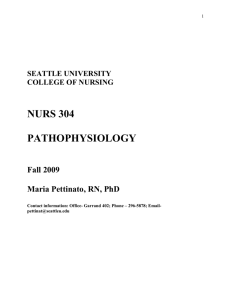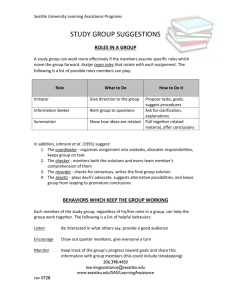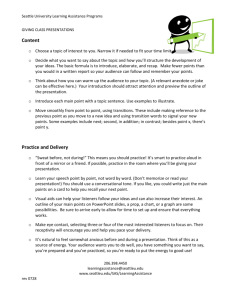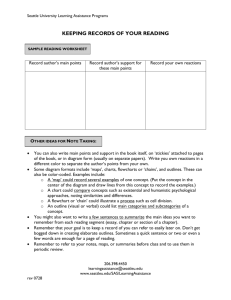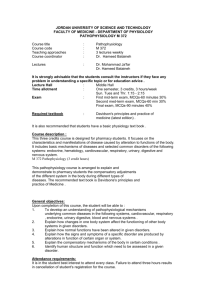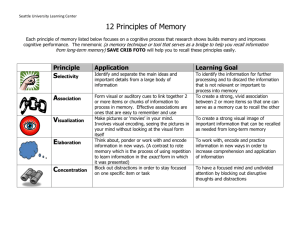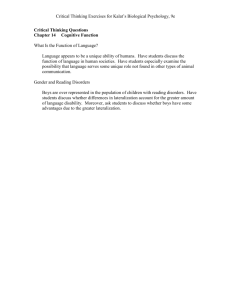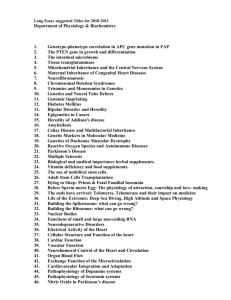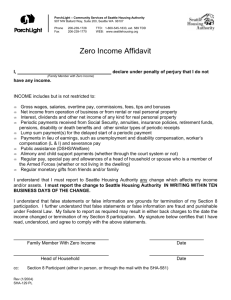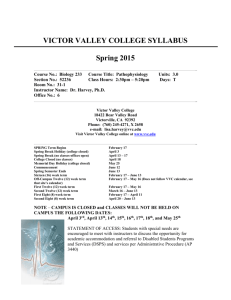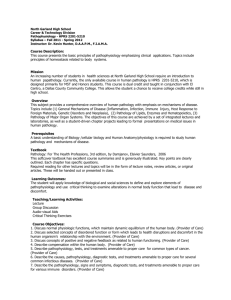NURS 524: Advanced Pathophysiology
advertisement
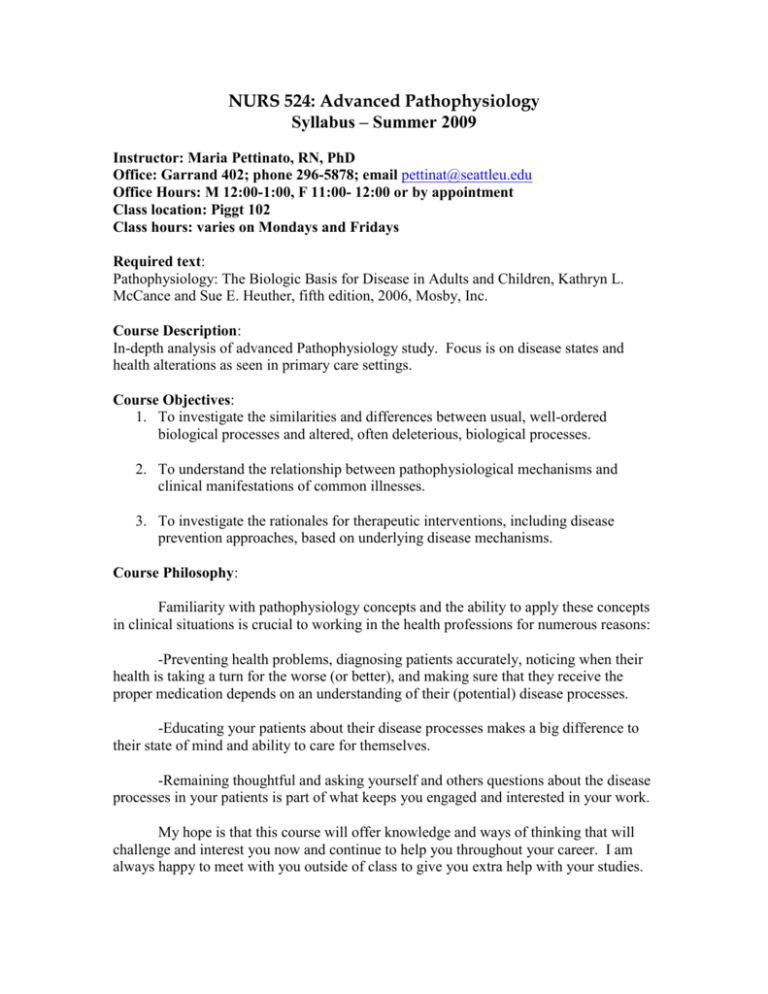
NURS 524: Advanced Pathophysiology Syllabus – Summer 2009 Instructor: Maria Pettinato, RN, PhD Office: Garrand 402; phone 296-5878; email pettinat@seattleu.edu Office Hours: M 12:00-1:00, F 11:00- 12:00 or by appointment Class location: Piggt 102 Class hours: varies on Mondays and Fridays Required text: Pathophysiology: The Biologic Basis for Disease in Adults and Children, Kathryn L. McCance and Sue E. Heuther, fifth edition, 2006, Mosby, Inc. Course Description: In-depth analysis of advanced Pathophysiology study. Focus is on disease states and health alterations as seen in primary care settings. Course Objectives: 1. To investigate the similarities and differences between usual, well-ordered biological processes and altered, often deleterious, biological processes. 2. To understand the relationship between pathophysiological mechanisms and clinical manifestations of common illnesses. 3. To investigate the rationales for therapeutic interventions, including disease prevention approaches, based on underlying disease mechanisms. Course Philosophy: Familiarity with pathophysiology concepts and the ability to apply these concepts in clinical situations is crucial to working in the health professions for numerous reasons: -Preventing health problems, diagnosing patients accurately, noticing when their health is taking a turn for the worse (or better), and making sure that they receive the proper medication depends on an understanding of their (potential) disease processes. -Educating your patients about their disease processes makes a big difference to their state of mind and ability to care for themselves. -Remaining thoughtful and asking yourself and others questions about the disease processes in your patients is part of what keeps you engaged and interested in your work. My hope is that this course will offer knowledge and ways of thinking that will challenge and interest you now and continue to help you throughout your career. I am always happy to meet with you outside of class to give you extra help with your studies. Evaluation Methods: Three quizzes Final exam 20% each 40% Grade Distribution Final grade computation is as follows: A AB+ B BC+ 4.0 3.7-3.9 3.3-3.6 3.0-3.2 2.7-2.9 2.3-2.6 94 and up 90-93 87-89 83-86 80-82 77-79 **C CD+ D DF 2.0-2.2 1.7-1.9 1.3-1.6 1.0-1.2 0.7-0.9 0.0-0.6 73-76 70-72 67-69 63-66 60-62 below 60 **Minimum passing grade for APNI and Foundation MSN courses. Classroom conduct: Please feel free to ask questions – it helps us all learn and keeps class lively. We come from a variety of backgrounds and bring different interests to this class – I welcome everyone’s perspectives and contributions. Occasionally, in the interest of using class time most effectively, I may ask you to postpone questions until the end of class. Attendance and participation are a vital part of the course. Please check in with me if you need to miss class. Excessive absences may lead to a reduction in your final grade. Please be punctual. Turn cell phones and pages off or set to “vibrate” mode. Statement from the Student Handbook: “Standards of conduct assist each student in the development of a responsible lifestyle rewarding to the individual student, respectful of the rights of others, and compatible with the legal norms of society. It is neither possible nor necessary to specify every instance of behavior or misconduct that could result in disciplinary action against a student. Conduct that evidences good intentions, mature consideration of the foreseeable consequences, and respect for the rights of others generally will not conflict with University standards”. Refer to the Code of Student Conduct regarding the following areas: Acts of Dishonesty, Responsible Use of Property, Conduct toward Others, Health and Safety and General Conduct (Code, pp. 3-6). Seattle University Nondiscrimination Policy: Seattle University does not discriminate on the basis of race, color, religion, sex, national origin, age, disability, marital status, sexual or political orientation, or status as a Vietnam-era or special disabled veteran in the administration of any of its education policies, admission policies, scholarship and loan programs, athletics, and other schooladministered policies and programs, or in its employment related policies and practices. All University policies, practices and procedures are administered in a manner consistent with Seattle University’s Catholic and Jesuit identity and character. Inquiries relating to these policies may be referred to the University's Associate Vice President of Human Resources and Equal Opportunity Officer. Consistent with the requirements of Title IX of the Education Amendments of 1972 and its implementing regulations, Seattle University has designated three individuals responsible for coordinating the University's Title IX compliance. Students or employees with concerns or complaints about discrimination on the basis of sex in employment or an education program or activity may contact any one of the following Title IX coordinators: Philip Irwin, Associate Vice President of Human Resources and Equal Opportunity Officer, University Services Building 107, 206-2965869, irwinp@seattleu.edu; Robert Kelly, Assistant Vice President for Student Development, STCN 140B, 206-296-6066, rkelly@seattleu.edu; Robert Dullea, Vice Provost for Academic Administration, Administration Building 104, 206-296-6151, dullea@seattleu.edu (Revised 11/15/05) Referral to Disabilities Services: If you have, or think you may have, a disability (including an ‘invisible disability’ such as a learning disability, a chronic health problem, or a mental health condition) that interferes with your performance as a student in this class, you are encouraged to discuss your needs and arrange support services and/or accommodations through Disabilities Services staff in the Learning Center, Loyola 100, (206) 296-5740. Study Suggestions and Assignments: I cannot overemphasize how important it is to understand normal structures and functions of the body (what you learned in your A&P class) in order to understand disease processes (what you are going to learn in this class). It is your responsibility to review this material, although I will sometimes give mini-physiology reviews when it is most crucial and there is time. You will notice in the textbook that the first chapter on each topic is a physiology review (very useful!) and the last is generally about children. The lectures will usually not cover children, but I recommend that you scan the pediatric chapters, especially if you have an interest in treating kids. Each week, I will PowerPoint presentations that will be useful as you focus your reading from the text. I highly recommend reading the physiology review chapter and scanning the rest of the relevant chapter/s before lectures, then reading it in more depth afterward. Studying your class notes – focus on understanding concepts and terms rather than just memorizing them – is the most effective preparation for quizzes and tests. Studying with a partner or small group, taking turns asking questions and explaining concepts is usually helpful and fun. I am always happy to meet with you to give additional study tips or explanations of concepts. Please feel free to arrange a meeting time with me other than during my posted office hours. Email is the best way to contact me outside of class. I recommend buying a new or used medical dictionary, if you do not already own one, and getting into the habit of looking up unfamiliar terminology, with particular attention to the meanings of the Greek and Latin roots. Questions that Arise in Class: During each class, students will be in charge of keeping track of any questions none of us can answer on the spot. Students will then look into these questions and report back on the following Monday or Friday. COURSE SCHEDULE WEEK TOPICS ASSIGNMENTS ONE – 6/22/26 Intro to course & Concepts of Pathophysiology Begin Inflammation, neoplasia & Immune Disorders Relevant reading in text TWO – 6/29 Musculoskeletal, GI Relevant reading in text THREE – 7/6 Urinary/Renal Disorders Fluids & Electrolytes, Endocrine Disorders Relevant reading in text Friday-Quiz FOUR – 7/13 CV System, respiratory, Acid/base, Relevant reading in text Cardiovascular Disorders Friday-Quiz FIVE – 7/20 Neurologic Disorders, Reproductive Disorders Relevant reading in text Friday- Quiz SIX – 7/27 Genetics Relevant reading in text SEVEN – 8/3 Comprehensive final
